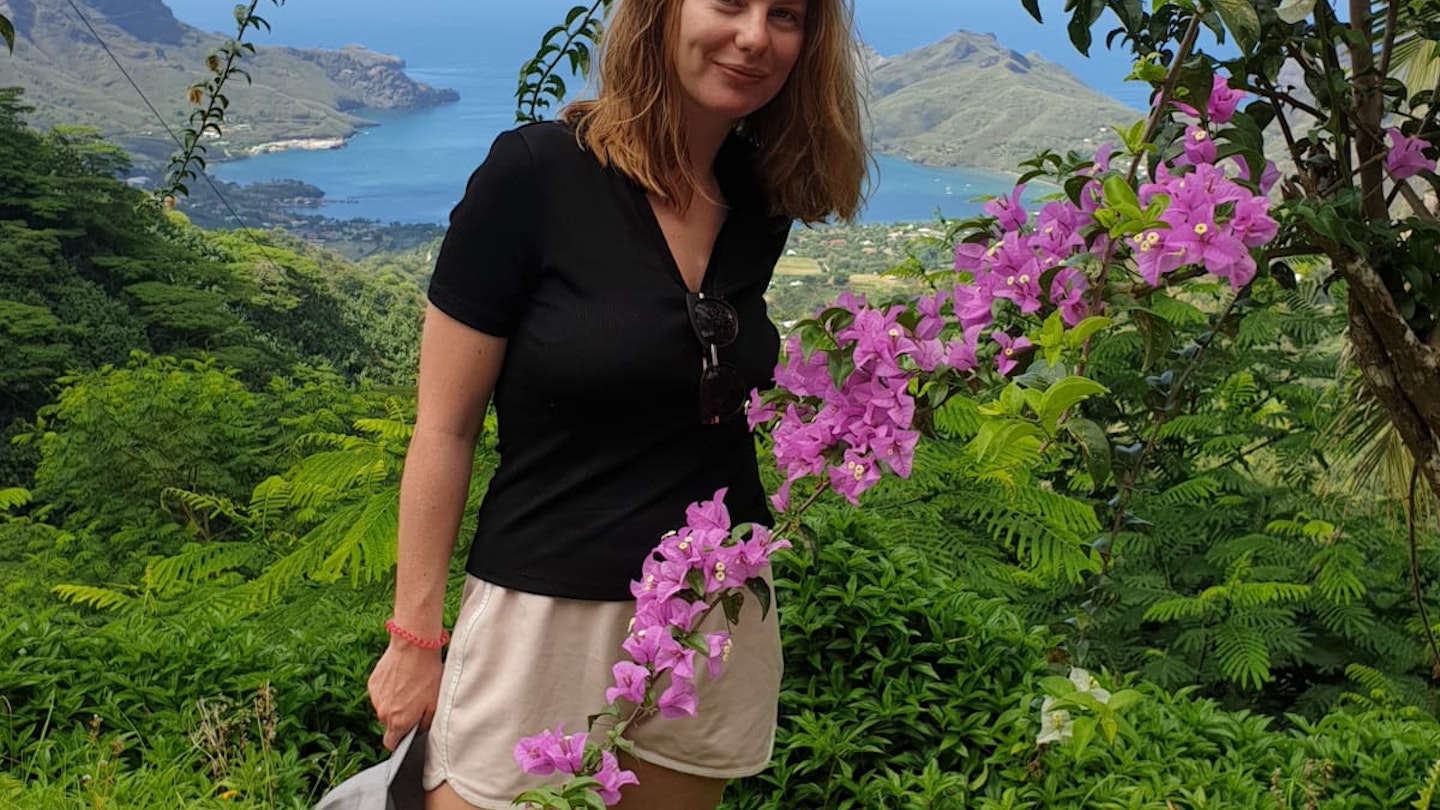Nov 30, 2019 • 6 min read

“We have a very tiny prison,” William says. We are standing at the edge of a dusty mountain path, overlooking the busy Taioha’e Bay. The term ‘busy’ is relative, as it has been over an hour since we left Nuku Hiva airport, and these are the first buildings we have seen since, all of which are modest single-storey structures.

We have traversed lush, endless valleys and navigated winding cliffside roads, dodging roosters that wander into our path. After spending an hour away from the main areas, seeing civilization again comes as a surprise; we cannot help but peer curiously at it.

“Yes, it’s a very tiny prison. It has only three people in it.”
“What crimes have they committed?”
“Oh, there’s no crime here,” he replies, returning to the Range Rover. “Everyone knows each other too well.”
“Then who is in jail?”
William converses in French with a member of our group who understands him. “It’s a drunk tank,” he translates. “That’s who’s in there.”

Nuku Hiva is home to three thousand residents, abundant wild livestock, and its three drunks. As the second largest island in French Polynesia and the largest of the Marquesas Islands, it provides a unique atmosphere devoid of mobile signal. The island reportedly has 2G internet; however, no one seems to use it. For those seeking a digital detox, Nuku Hiva is the perfect paradise.

After another half hour, we finally reach the bay. Civilization does not gradually emerge here; instead, it appears in concentrated clusters surrounded by untouched bush. A horse without a saddle is tethered to a tree, looking at us curiously.
Men emerge from the trees, dressed casually in cargo shorts. All of them are familiar with our guide William and seem to embody a relaxed balance between work and leisure. Regardless of age, everyone on the island exchanges friendly fist bumps and the signature shaka greeting, a gesture recognized throughout French Polynesia.

A group of young men have set up around a campfire, with an iPhone speaker in their backpacks and a wild boar tied nearby. While they will eventually cook the boar, there is no urgency in their actions. The atmosphere is leisurely and warm, showcasing the motto that here, “you don’t need money.”

Interestingly, the name Nuku Hiva translates literally to ‘Land of Men’. The pride of the Marquesan culture reveals a fierce dedication to their reputation for strength and valor, and Nuku Hiva exemplifies this ethos.
The tour includes a visit to see the casse tête, a traditional rosewood club known for its effectiveness in combat. Nuku Hiva’s historical sites are rich with tales of its warrior society, where men often ascended in tribal ranks through their bravery and cunning.

Curiously, the women were not granted equal status within this tribal system. Subsequently, I found myself in the island’s only pharmacy, which was rather small and dedicated an entire wall to control-top underwear.
The discomfort of such garments is generally well-known; in this tropical heat, it felt particularly strange to see men shirtless while women purchased girdles.

Interestingly, the warrior energy of the Marquesas has, over the years, transformed into a much less aggressive and more laid-back culture, characterized by nature enthusiasts. We pass by a group of goats on a precarious cliff edge, oblivious to their surroundings. I wondered who left them water, given that there were no fences, houses, or recent rain.
The guide merely shrugs, indicating the goats seem to thrive on the stewardship of the community more than any intensive farming practices. This philosophy extends to produce as well; food like breadfruit, taro, manioc, and coconut grow plentifully, with smoke rising from cooking fires across the island.

Even the imported goods align with sustainable practices. The lifeblood of the island is the Aranui, a dual-purpose vessel facilitating tourism and cargo transport. It’s fascinating to observe how tourists disembark on one side while cargo is loaded from the other.
Bags and containers are moved with effortless efficiency, with minimal visible management. For those concerned about the environmental impacts of conventional cruise tourism, the Aranui presents an intriguing model.

Everything on this island is cherished, reused, and regenerated. The community feels a collective ownership over the land, though this harmony can sometimes lead to amusing encounters with the wildlife; for instance, a rooster can just as easily appropriate your morning peace.

During my stay at the Pearl Lodge, Nuku Hiva’s only luxury accommodation option, I encountered all the charm of this beautiful retreat that offers 20 bungalows, an infinity pool, and a private beach for €243 per night. However, be warned—this paradise does not guarantee a serene morning unless you have earplugs or wish for an impromptu chicken roast.

Legends tell of men who have visited the Marquesas, captivated by its allure. Figures like Paul Gauguin and Jacques Brel called this place home, and Herman Melville even found inspiration here deep within the cannibal communities. The captivating beauty of Nuku Hiva, with its majestic landscapes and rich cultural heritage, remains undeniable.
Standing on the edge of Hakui Valley and witnessing the mist cascading around the Vaipō waterfall gives one a profound sense of connection to the earth. Nuku Hiva offers an arresting beauty that lingers long after you depart—indeed, one might conclude that money is unnecessary here, except if you happen to be a woman in need of girdles.
Caroline O’Donoghue traveled to Tahiti with support from Tahiti Tourisme. GoTravelDaily contributors do not accept freebies in exchange for positive coverage.





